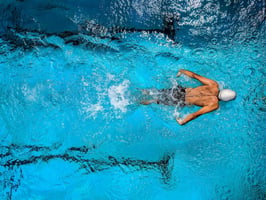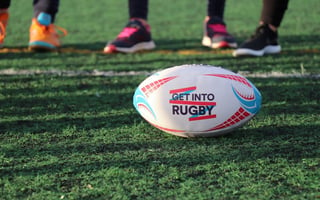Who grabbed the attention of our media training experts for all the wrong reasons this year?
Another Olympic Games has come to an end.
Two weeks of competition has brought no shortage of action, tension, tears and inspiration.
And many media interviews.
There have been plenty of interviews with athletes celebrating success and coming to terms with disappointment.
And some grabbed our attention for all the right reasons and offer lessons for others about media interview skills and newsworthiness.
Rose Harvey
One of the best stories of the Olympics came after the event had ended.
It emerged on Monday that Team GB marathon runner Rose Harvey has completed the gruelling race despite breaking her leg.
The British athlete finished 78th - in a time of 2:51:03 - despite crossing the line with a stress fracture of her femur.
"It was really tough," she said in an interview with the BBC that you can watch here.
"The hills didn't help at all. The downhills were just agony, and it just got worse and worse. At the halfway mark, I knew it was going to be incredibly painful."
She added: “The Olympic energy was kind of what kept me going to that finish line.
"Any other race, I would have stopped because I wasn't able to run like I normally can... and the pain was really bad, but I just had to get to that finish line, I had to do the Olympic marathon."
She also said the ‘what if’ factor was a crucial part of keeping going.
She said: "I think the other big thing is I knew deep down if I stopped, I would always wonder 'What if I could've just run an extra mile?' And I wouldn't be able to live with that."
Rose Harvey, you are INCREDIBLE. 🫡👏#BBCOlympics #Olympics #Paris2024 pic.twitter.com/JYrYCazCOM
— BBC Sport (@BBCSport) August 13, 2024
The story is a brilliant reminder of the importance of the ‘unusual’ factor in news stories.
Running a marathon is an incredible feat. Doing it with a broken leg is remarkable. And people want to hear about it.
As we stress during our media training courses, journalists love the unexpected, unique angles and fresh perspectives.
You may not have a story about running a marathon on one leg.
But you and your organisation could have a story about something that is the biggest, the smallest, the first or the last, for example.
Or you may have something that challenges conventional viewpoints and offers fresh insight.
Daniel Wiffen
During our media training courses, we always stress the importance of spokespeople showing their personality in media interviews.
Audiences love authentic spokespeople. Not talking robots.
We want people to share their feelings, stories and anecdotes.
Ireland’s Daniel Wiffen did just that.
Having already won 800-metre freestyle gold and 1500m bronze in the swimming pool, he took part in the men’s 10km marathon swim in the River Seine.
And he was happy to share that he did not enjoy the experience, calling it “probably one of the worst things” he had done.
"When I got to halfway, all I was thinking was 'I'm already Olympic champion, and I’m swimming this and I’m coming 18th. We’ll just finish it now, and then I’m never doing it again’.
"My goal coming into this was to finish. I’m very pleased with myself and happy I didn’t come last so that’s the main thing.
"All the coaches were laughing because I was swimming out by myself because I wasn’t arsed going behind somebody. I can’t be arsed getting kicked in the face.
"I got a couple of elbows in the eye and punched in the face at one point. This sport isn’t for me. I definitely want my own lane next time."
He added that he was retiring from open-water swimming.
"It's probably one of the worst things I've ever done but happy I did it... I'm retiring from open water!" - Daniel Wiffen is planning "to party" after completing his superb Olympics with the 10km marathon swim
— RTÉ Sport (@RTEsport) August 9, 2024
📺 Live on @RTE2
📱 Live updates https://t.co/JcS0y4dHUk#Paris2024 pic.twitter.com/h6zvtbEoPe
When asked by the RTE journalist what he would do with his remaining time at the Olympics, he said: “You’ll see me out in the nightclubs tonight having some Guinness.”
Jemima Montag
Post-event interviews are not always the best.
They tend to be short, sharp and often bland or full of clichés.
But not all of them.
Australian athlete Jemima Montag won two bronze medals in racewalking during the Paris Olympics.
And during her post-race interview, she articulated powerful messages about what her success means and the benefits of taking part in sport at all levels, not just the Olympics.
Asked how it felt to win a bronze medal, she said: “It’s a careful balance of wanting that medal but not needing it. It is really a nuanced difference.
“So, not needing it for your own self-worth or feeling that people love you, but wanting it. Saying ‘Yeah, I’m willing to give this a crack and be tough. And if it doesn’t happen, the sun will rise tomorrow, but let’s give it a go’.”
When the reporter asked what her message was for young girls watching her success, she said: “I want them to know this journey isn’t without its challenges, particularly around the age of 16 and 17. I certainly questioned my place on the sporting field and whether I wanted to take it to this Olympic level.
“But the message is it doesn’t matter if you are doing sport for fun in your backyard with your girlfriends or whether you want to take it to this Olympic medallist level, sport is about community and a sense of belonging, making friends and looking after our physical and mental health. And learning amazing life skills like dedication and leadership, which are all such great things for the next generation of women and girls.
“So, play on in your own way, whatever suits you.”
LOVE this interview from Australian racewalker, Jemima Montag, after her bronze medal performance at the Paris Oympics.
— Zach Brandon (@MVP_Mindset) August 13, 2024
"You want to show gratitude for the 15 year journey...but it's a careful balance of 'wanting' that medal but not 'needing' it...Not needing it for your own… pic.twitter.com/RXhELi2B2M
Detailed preparation is crucial to elite sport and media interview success. Montag’s Olympic preparation appears to have included thinking about what she wanted to say to the media.
Adam Peaty
Emotion can be potent in media interviews.
It shows the audience you care, can build connections, and has an impact.
Swimming star Adam Peaty gave one of the more emotional interviews of the games.
The 29-year-old narrowly missed out on backstroke gold, having overcome mental health issues and a broken foot as he tried to win the same event for the third consecutive Olympics.
"In my heart, I've already won," he told the BBC after the race.
"It’s been a very long way back. And I look at the score there, and you would never think in your wildest dream that it would be 59s to win it there.
"I executed as well as I could. It doesn’t matter what it says on the scoreboard because, in my heart, I know that I’ve won there.
"I’m not crying because I’ve come second, I’m crying because of how hard it’s been to get here.”
We are not suggesting your spokespeople should break down or wipe away tears during media interviews, but it is essential they come across as human and show that they care about the subject.
Andy MacDonald
He may not have won a medal, but Andy MacDonald has to be one of the stars of the games.
Making his Olympic debut at 51, the skateboarder brought fun, inspiration and passion to the competition.
And his media interviews.
He created one of the more memorable sound bites of the Olympics by claiming to have won the medal for “most fun”.
He said: “I was asked, ‘Are you going for the gold?'. “And I'm like, ‘If they're giving away gold medals for whoever has the most fun, I got it wrapped up, right?’ Definitely won the gold medal for most fun.”
A joy to watch 51-year-old 'rad dad' Andy Macdonald earn cult hero status today at the skatepark, where the adopted Brit was watched by Tony Hawk. "If they were giving away gold medals for those having the most fun, I had it wrapped up." What a guy 🛹 https://t.co/smvoE1m8Mq pic.twitter.com/i3pxAH1UyA
— Fi Tomas (@fi_tomas_) August 7, 2024
He also described taking part as the “experience of a lifetime”. He said: “What place did I get?’ I had no idea. I wasn't here for the scores. I was here to be here. I'm so excited just to have qualified for Paris. It was a long shot to get here from the get-go.
And he added: “I was trying to represent, like, 'Hey, this is fun no matter what age you are'. This is like the coolest, funnest, most inclusive thing that you can do. And it's my livelihood.
“I'm lucky enough that I can make a living doing it, but it keeps me young. It's literally the fountain of youth. Skateboarding is my fountain of youth. I've been doing it since I was 12 years old, and I'm 51 and still enjoying every minute of it.”
We love to see passion in media interviews. It is infectious, makes people sit up and take note, builds trust and can turn doubters into believers.
The next Olympics takes place in Los Angeles in 2028 – maybe Andy MacDonald will still be competing.
Media First are media and communications training specialists with over 35 years of experience. We have a team of trainers, each with decades of experience working as journalists, presenters, communications coaches and media trainers.
Click here to find out more about our media training.
Subscribe here to be among the first to receive our blogs.




